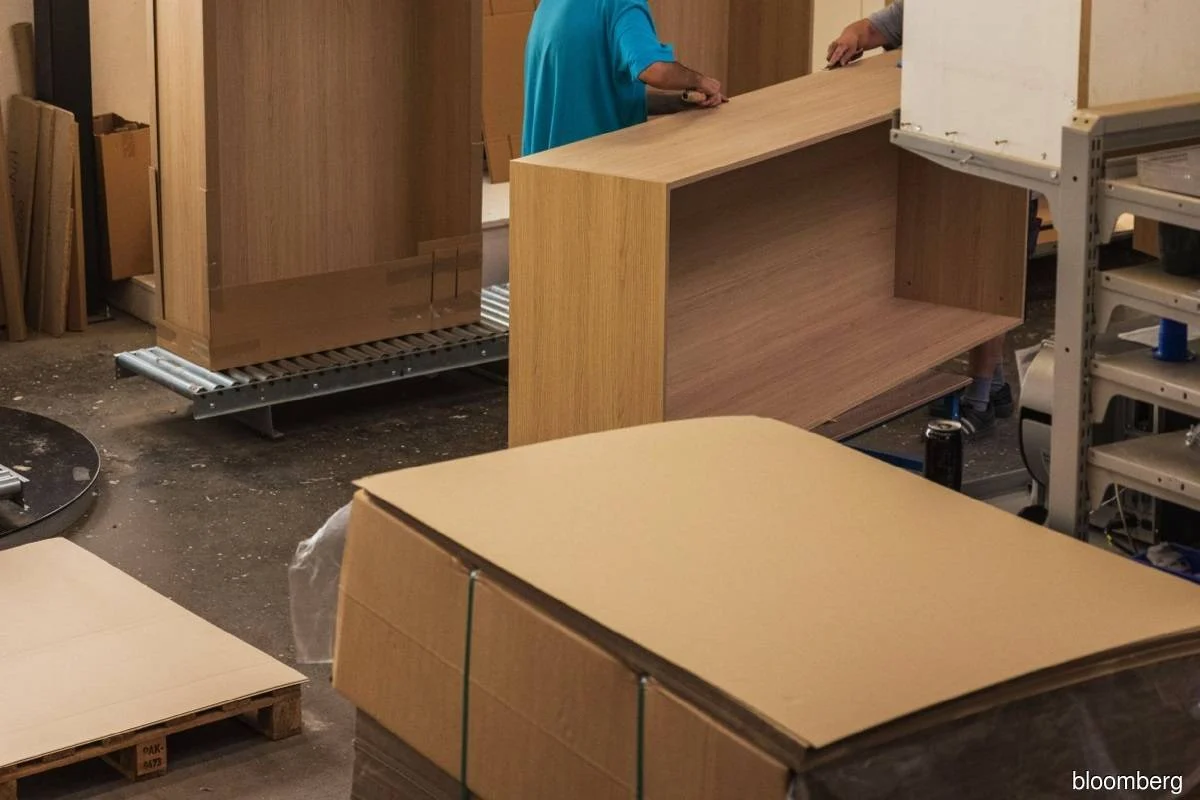Furniture makers face margin pressures amid rising input costs, slowing demand
 While the Malaysian International Furniture Fair's (MIFF) return after a two-year pause can be seen as an avenue for players to source new customers and bolster their order books, local furniture players are facing margin compression against a backdrop of inflationary pressures, rising input costs, and slower demand.
While the Malaysian International Furniture Fair's (MIFF) return after a two-year pause can be seen as an avenue for players to source new customers and bolster their order books, local furniture players are facing margin compression against a backdrop of inflationary pressures, rising input costs, and slower demand.
虽然马来西亚国际家具展 (MIFF) 在暂停两年后回归可被视为玩家寻找新客户和增加订单的途径,但本地家具厂商正面临利润率压缩在通胀压力、投入成本上升和需求放缓的背景下。
Contrasting the rosy landscape painted by Malaysia External Trade Development Corp (MATRADE) deputy chief executive officer Abu Bakar Yusof in his opening speech at the event, furniture makers said rising raw material costs, freight costs, sluggish demand from key export markets and the minimum wage hike have eaten into their profit margins.
与马来西亚对外贸易发展公司(MATRADE)副总执行长Abu Bakar Yusof在活动开幕词中描绘的美好景象形成鲜明对比的是,家具制造商表示原材料成本、运费成本上升、主要出口市场需求疲软以及最低工资加息侵蚀了他们的利润率。
Several furniture makers have opted to raise prices to offset the rising input costs, while others have maintained prices in a bid to remain competitive in the global market.
一些家具制造商选择提高价格以抵消不断上涨的投入成本,而其他制造商则维持价格以保持在全球市场上的竞争力。
"With the current order book that we have, we are not able to raise [our products'] prices. If we increase them, the price will not be competitive. We are not only competing within Malaysia, but also globally.
“以我们目前的订单,我们无法提高 [我们的产品] 价格。如果我们提高价格,价格将没有竞争力。我们不仅在马来西亚内部竞争,而且在全球范围内竞争。
"We cannot simply raise our prices, so it kills our margin and we have to just keep thinking of other innovations to improve our margins," Comfy Factor Sdn Bhd general manager Derrick Chong told The Edge at MIFF.
Comfy Factor Sdn Bhd 总经理 Derrick Chong在 MIFF 告诉 The Edge:“我们不能简单地提高价格,所以它会扼杀我们的利润,我们必须继续考虑其他创新来提高我们的利润。”
Johor-based furniture manufacturer CoreWorld Sdn Bhd director Amy Gan said that in spite of the company's price increases on its products deterring certain overseas buyers, she noted that the price hikes are not something the company can compromise on.
柔佛家具制造商 CoreWorld Sdn Bhd 董事 Amy Gan 表示,尽管该公司的产品价格上涨让某些海外买家望而却步,但她指出,价格上涨不是公司可以妥协的事情。
Likewise, a spokesperson of Sweet Home Concept Sdn Bhd said the elevated raw material costs have driven the company to increase its prices to cushion its profit margin.
同样,Sweet Home Concept Sdn Bhd 的一位发言人表示,原材料成本上涨已促使该公司提高价格以缓冲其利润率。
"[Freight and raw material costs] keep increasing, the quotation we get every week increases — it never goes down. I think it will keep increasing, and our margin is already quite low. So we just focus on our volume of sales," an Infurnex Resources Sdn Bhd spokesperson said.
“[运费和原材料成本]不断增加,我们每周得到的报价都在增加——它永远不会下降。我认为它会继续增加,我们的利润已经很低了。所以我们只关注我们的销售量,” Infurnex Resources Sdn Bhd 发言人说。
Additionally, local exhibitors at MIFF said that the government's move to increase the minimum wage from RM1,200 to RM1,500 also weighed down margins.
此外,MIFF 的当地参展商表示,政府将最低工资从 1,200 令吉提高至 1,500 令吉的举措也压低了利润率。
"With the rise in the minimum salary, we have 500 to 600 workers [on minimum wage] and now we have to pay RM300 more per month [per worker] — this is going to be a 5% to 8% increase in [salary] costs. This is a huge impact for us, [as] it is just an added cost.
“随着最低工资的提高,我们有 500 至 600 名工人(最低工资),现在我们必须每月多支付 300 令吉(每位工人)——这将使 [工资增加 5% 至 8% ]成本。这对我们来说是一个巨大的影响,[因为]这只是一个额外的成本。
"The government wants us to go towards more automation and for some furniture makers [this can work], but honestly it [will not work] for all manufacturers. For us, we do upholstery, which requires workmanship, so it has to be a skilled worker. It is not something where we can invest RM500,000 in a new machine and save 10% [in costs], it [does] not work that way for us," Chong said.
“政府希望我们实现更多的自动化,对一些家具制造商来说[这可以工作],但老实说,它[不会对所有制造商工作]。对我们来说,我们做室内装潢,这需要做工,所以它必须是技术工人。这不是我们可以投资 500,000 令吉购买一台新机器并节省 10% [成本] 的事情,它 [does] 不适合我们,”Chong 说。
Similarly, Sweet Home Concepts, CoreWorld, and 3 Day's Furniture Sdn Bhd also said that the rise in the minimum wage has resulted in an increase in their operating costs.
同样,Sweet Home Concepts、CoreWorld 和 3 Day's Furniture Sdn Bhd 也表示,最低工资的提高导致其运营成本增加。
Besides margin pressures, the furniture manufacturers said customer demand in key export markets have declined recently, as consumers are seen to shift their spending towards day-to-day necessities, as well as travel and leisure.
除了利润压力外,家具制造商还表示,主要出口市场的客户需求最近有所下降,因为人们看到消费者将支出转向日常必需品以及旅行和休闲。
"For example, we do a lot [of businesses] with the US market. With the reopening after the pandemic, people's spending has gone elsewhere — they are not buying furniture anymore. [Consumer's] spending has gone into other channels, so the demand [for furniture] is going down. It affects us a lot," Chong said.
“例如,我们在美国市场做了很多[业务]。随着大流行后重新开放,人们的支出转移到了其他地方——他们不再购买家具了。[消费者的]支出进入了其他渠道,因此需求[家具] 正在下降。这对我们影响很大,”Chong 说。
Gan shared this sentiment and said that CoreWorld's orders during the Covid-19 pandemic were "okay", but began to slump following the reopening of borders earlier this year.
Gan 也表达了这种看法,并表示 CoreWorld 在 Covid-19 大流行期间的订单“还可以”,但在今年早些时候重新开放边境后开始下滑。
3 Day's Furniture marketing executive Christy To concurred and noted that it is "not possible" for demand for furniture to recover this year, and added that it may take more than a year for demand to recover.
3 Day's家具营销主管Christy To对此表示赞同并指出,今年家具需求“不可能”恢复,并补充说需求可能需要一年多的时间才能恢复。
In view of the continued increase in raw material prices and the low demand for furniture in key export markets, local furniture makers have a grim outlook on the furniture industry in 2022, foreseeing an extended challenging operating environment going forward.
鉴于原材料价格持续上涨以及主要出口市场对家具的需求低迷,本地家具制造商对 2022 年的家具行业前景黯淡,预计未来的经营环境将面临长期挑战。
Abu Bakar — in his keynote address during the opening ceremony of the trade show — said that from January to May 2022, Malaysia's export of furniture was valued at RM6.14 billion, an increase of 3.2% compared with the RM5.96 billion in the same five-month period a year prior.
Abu Bakar在贸易展开幕式上的主题演讲中表示,从 2022 年 1 月至 2022 年 5 月,马来西亚的家具出口价值为 61.4 亿令吉,与 59.6 亿令吉相比增长 3.2%。与一年前相同的五个月期间。
"According to the Fortune Business Insight Report, the global furniture market revenue is forecast to grow from US$493.6 billion in 2021 to US$720.2 billion by 2028 at a compound annual growth rate of 5.5%.
“根据财富商业洞察报告,全球家具市场收入预计将从 2021 年的 4936 亿美元增长到 2028 年的 7202 亿美元,复合年增长率为 5.5%。
"With rising demand from key markets, Malaysia's wood furniture industry has the potential to improve and penetrate new global markets," he said.
“随着主要市场需求的增长,马来西亚的木制家具行业有潜力改善和渗透新的全球市场,”他说。
